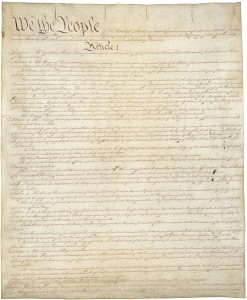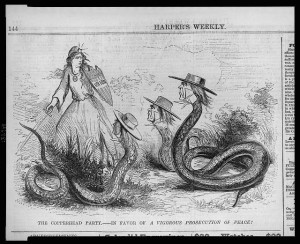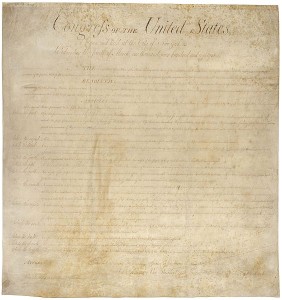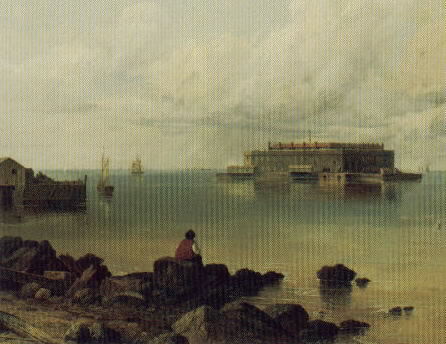Eventually Headed for Peaceful Waters – if a Democrat at the Helm
Peace Democrat James Wall has his work cut out for him in the five weeks he’s going to be in the United States Senate.
From the Richmond Daily Dispatch January 28, 1863:
Address of a Newly-elected U. S. Senator.
Col. Wall, the recently elected U. S. Senator from New Jersey, was serenaded in Philadelphia on the 21st inst. He was introduced by Mr. James C. Vandyke in a brief speech, in which a eulogy was paid to the words “traitor,” “rebel”–words which he said had more than ordinary significance because Washington and his compatriots were proud to be honored with such appellations. We extract the following from his speech, as reported in the Press:
I know, fellow-citizens, that there are many of us here to-night who, like honest Gonsalvo in Shakespeare’s play of the Tempest, would give a “furlong of sea for a barren acre of ground.” My friends, we must stick to the ship, and, whatever be its fate, you and I must share its destiny. There is a precious freight on board this tempest tossed bark. The waters are white with the foam beneath her bow. There is no time to take to the long boat. That tempest-tossed vessel is freighted also with the precious Constitution our fathers gave us. The compass by which they steered it is still on board that vessel, and in order to preserve it we have got to stick to the ship. [Cries of “that’s so,” and cheers] My friends, there are men now navigating that vessel who are attempting to steer her by the compass of coercion, and to drive her by the chart of a “higher law.” [Cheers and counter cheers] It is to watch these men that we have got to stick to the ship. I do not believe that the old vessel will ever be saved until a Democratic commander again walks the deck [cheers] and the strong hand of a Democratic pilot is upon her helm. [Renewed applause and cheers for Wall]
Fellow-citizens, I have recently at the hands of the Legislature of the State of New Jersey, [three cheers] been tendered the responsible office of Senator of the United States. I go there, my friends, as I understand it, to advocate as far as my limited abilities will permit — to advocate, I say, peace in that body. [Cheers for “peace.”] I cannot say, my friends, how this is to be brought about, but I believe I speak the sentiments of the people of New Jersey, and not only of the people of New Jersey, but of the loyal people of Pennsylvania, when I say that they will hail the hour, that shall bring us from out this lurid tempest of war into the calm and blessed shade of a long and lasting peace. [Cheers] My friends, I go, also, as I understand it, upon the floor of the Senate of the U. States to advocate those great principles of civil liberty which were handed down to us from our fathers [renewed cheers,] those great principles which are embodied in the amendments to the Constitution of the United States, every one of which I am sorry to say, has been trampled under foot by the present Administration. [Applause]
Gentlemen, you will recollect that it is but a few months ago that men were afraid to express the truth that was in them; but now, how great the charge! A short time ago, I gentlemen, endured obioquy and insult of the grossest character. Aye, my family had to submit to the grossest insults in the city of Burlington, and my daughters insulted by the wenches on the streets. When I ventured to complain I was charged with disloyalty. I have had no distinct accusation against me, though I have time after time demanded to know it. I wrote to Mr. Cameron to know why I had been imprisoned in the dungeons of Fort Lafayette. [Cheers and groans for Cameron.] But, gentlemen, after I had been imprisoned for weeks, and then let free, I wrote to Mr. William H. Seward. I said: “Sir, I have written to the Secretary of War for the purpose of being informed why I was put in the bastiles of the Administration; now please tell me why I was let out? [Cheers and laugher.] I have not been able to find out either.
Charles W. Carrigan followed in a short speech and the crowd soon after dispersed. The band played numerous tunes, but not one was of a national character.
The Cincinnati Enquirer thus commends the action of its political allies in New Jersey:
Col. Wall was one of the first victims thrown into the Administration bastile in New York by Simon Cameron. He is an able, bold, and eloquent man, and has been opposed to the war from the start. He is just the man for Senator. The Administration throws him into a bastile — the people make him Senator.




